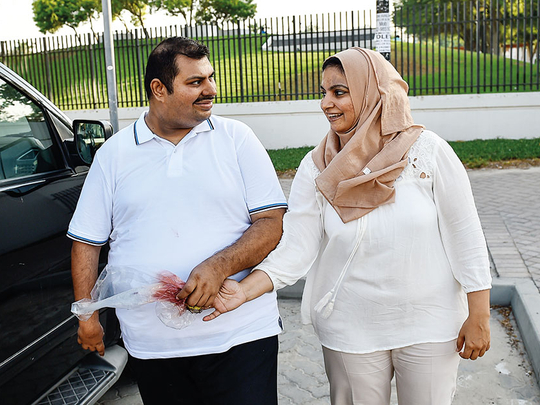
Dubai
For 40-year-old Lubna Mohammad Younus from Pakistan, taking care of her brother with special needs has become a regular part of her daily routine.
Her 35-year-old brother, Mohammad Rizwan, suffers from cerebral palsy (CP), a disorder that affects muscle tone, movement, and motor skills, which he was diagnosed with after having a severe fall when he was four months old.
Living with her brother, Riz-wan, her 70-year-old mother, and seven-year-old son, Lubna who has lived in Dubai for over 20 years, said the key to dealing with an individual with special needs is to understand their personality.
“People with special needs are interesting persons and are cooperative. You have to consider their personality and their needs to know how to deal with them. Even though they can’t articulate [in the expected way], if you give them time, you will understand them,” said Lubna.
She pointed out that keeping her brother active helps cheer him up, which sometimes becomes a challenge during Ramadan.
As for the adjustments they have to make for Rizwan during Ramadan, the family describes those challenges as “minor”.
“Rizwan doesn’t trouble us. Mum feeds him breakfast in the morning because his meal routine is the same. We usually try to close the kitchen after 2am, but sometimes we have to make meals for him during the day,” said Lubna.
One daily caution they have to observe during Ramadan is to not disturb Rizwan’s sleep during suhour time. A light sleeper, Lubna says once he wakes up, it is a task to get him to go back to sleep.
“He sleeps by my mum’s side and wakes up very quickly if he hears any sound. If he’s up, he needs to be taken to the washroom and wants his clothes changed. We usually have a limited time to eat [during suhour], so we try hard not to disturb him,” said Lubna.
“In Ramadan, with fasting and iftar, it is sometimes difficult for someone from the family to take him for swimming as often as he would like. He can stay in the water for hours and hours and wouldn’t mind going everyday,” said Lubna.
Having graduated from Al Noor Training Centre over 10 years ago, Rizwan has not since attended a centre for adults with special needs on a regular basis.
In 2013, Rizwan fell and fractured the femur bone in his right leg, followed by a similar injury in his left leg the year after. “It took him time to be able to walk again, and because of the injuries, he wasn’t able to do many activities so he began to put on weight,” she said.
Rizwan loves to go for walks and has even taken part in several running competitions at the training centre. However, the hot weather and lack of help around have made it hard for his family to take him out for a stroll often.
“My mum is 70 years old now, she isn’t able to take him out as much as before. We hired a man who used to help take him to the club, but now it’s just us,” explained Lubna.
“When he was younger, Rizwan would love to be driven around in the car. If he fell asleep and the car stopped, he would instantly wake up. He loves going to social gatherings and meeting with people, and always wants to put on nice clothes,” she said.
Family love
Rizwan, whose favourite hobby is swimming, loves going to the Al Thiqa Club for the Handicapped in Sharjah.
Being the youngest of six siblings, Rizwan was often considered the “baby of the family, and was always smothered with love and attention”.
“At a point, all my brothers and sister got married and some moved away, so we are not always around Rizwan as we used to be when we were all younger. Everyone still loves him a lot and they help whenever they are around or visiting,” said Lubna.
She pointed out that awareness about her brother’s condition was non-existent at the time when Rizwan was diagnosed with cerebral palsy.
“Back then, people who had children with special needs would hide them; there was no interest in learning how to understand them. Now people are more aware and sensitive,” said Lubna.
She explained that from the initial stages of diagnosis, families with children with special needs should encourage siblings to get involved, show their support, and do their part in trying to understand the child’s personality and condition.












